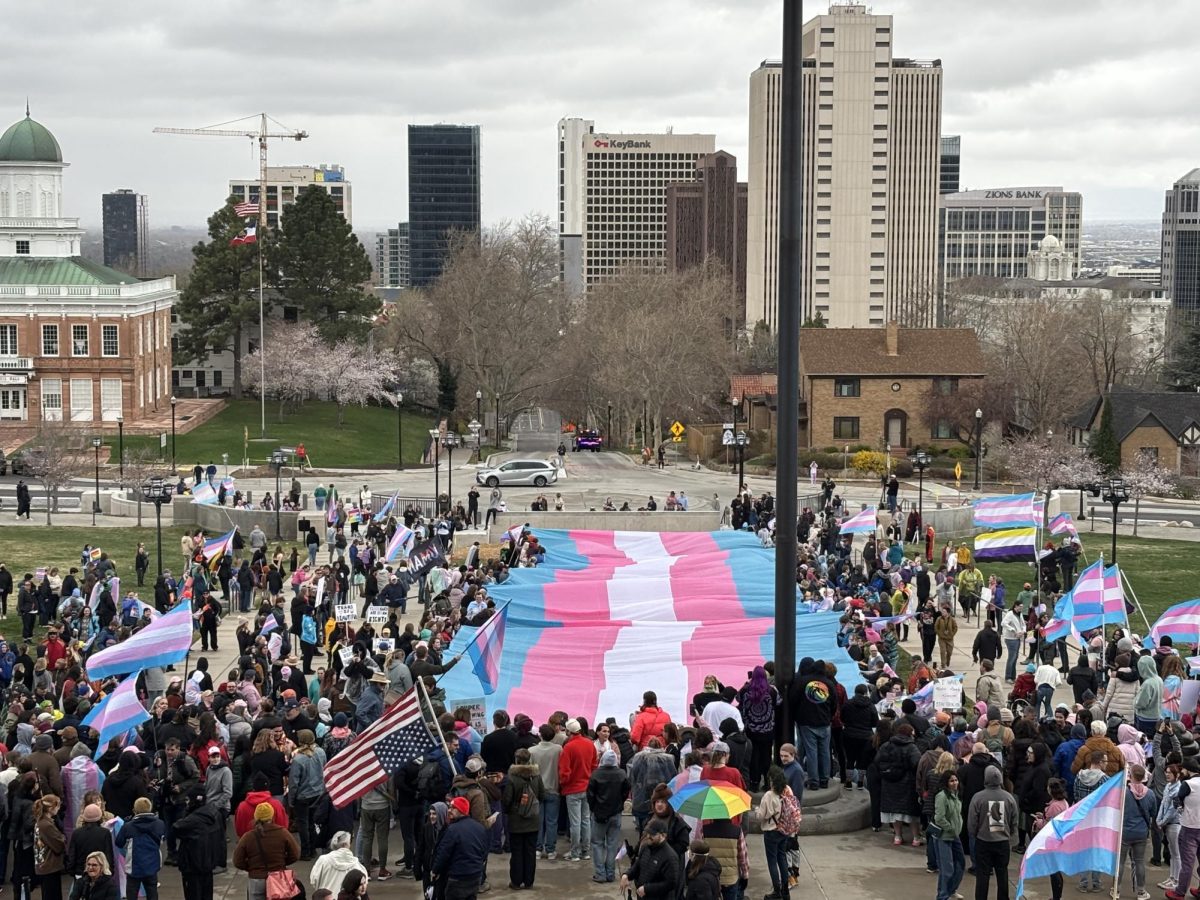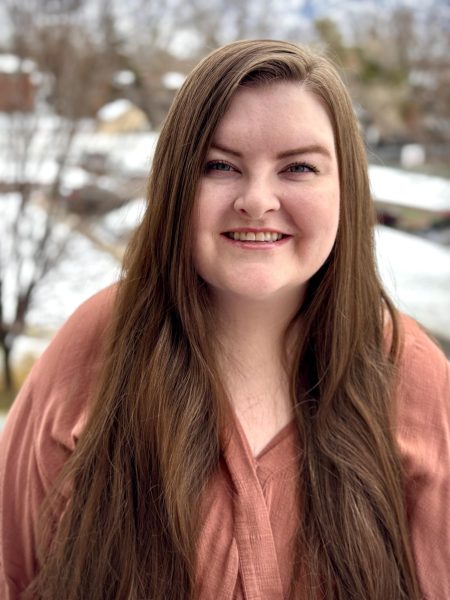Last Saturday, hundreds of people gathered on the steps of the Utah State Capitol for Transgender Day of Visibility. After speakers at the event shared their experiences discovering themselves and their identity, participants unfurled a 200 foot transgender pride flag and carried it down State Street together.
The event, hosted by the Utah Pride Center in partnership with The Glitter Foundation, took place after HB77 went into effect on March 27. This law prohibits the display of LGBTQ+ pride flags in government buildings and public schools. According to Gov. Spencer Cox, “political neutrality in schools” was the goal of this bill.
While the bill’s verbiage does not explicitly mention pride flags, the bill’s chief sponsor, Rep. Trevor Lee, R-Layton, has been outspoken about his views on pride flags and the intended purposes of the bill. He claimed that Salt Lake displaying a pride flag at City Hall was “pushing a political agenda on the taxpayers dime.” He’s shared similar posts on X.
However, the bill only bans flags defined as “rectangular piece of fabric with a specific design that symbolizes a location, government entity or cause,” meaning individuals are not restricted from wearing items such as pins, lanyards or shirts with pride symbols.
Visibility Is Power
The event’s first speaker Joselyn Romero, executive director of Arches Healing and Growth, began their speech by acknowledging “trans people, allies, friends. All people gathered today to celebrate visibility.”
“We are filled with joy. And on top of that, when we talk about our experiences, I look at this day as a day to celebrate us. The people who are living our truth. Showing up for ourselves and each other and making our presence known in this world. We are not going anywhere,” Romero said.
They received a round of applause and cheers from the crowd before continuing.
“We stand here today not just as a community, but as a vibrant, beautiful, diverse, collective of people who are proud to exist, to thrive and to be visible,” Romero said. “Visibility is power. It’s strength.”
They also acknowledged the anger many feel in response to recent legislative efforts targeting transgender people. For example, the legislature passed HB269 this year, limiting on-campus housing options for transgender students. Still, Romero emphasized that legislation can’t erase the existence of transgender people.
“Our gender or non-gender is ours to define. It does not belong to the government, to anyone else, and they shouldn’t decide what gender should be,” they said. “But here’s the thing, even though this is … painful and frustrating, we won’t be silenced. We won’t be erased, and we won’t stop fighting.”
Romero ended their speech by reiterating the importance of fighting for trans rights.
“Today is a celebration of pride, of joy and of unity. It’s a reminder that we are here to stay.” Romero said. “We are here to stay, and we will continue to fight for a world where all trans people can live freely, safely and without fear of discrimination or violence.”
Trans People’s Existence
The following speaker, Audry Cevering, began her speech with a disclaimer that her message would be “a little bit more personal today.”
Cevering thanked the crowd for showing up and stressed that “whether you are cis or trans, gay, bi or straight, an ally yourself or looking for your community, you belong here. Your visibility here today is key to helping us all maintain the rights that we love, revere and are rallying to protect.”
Cevering spoke of her experience being raised as a member of the Church of Jesus Christ of Latter-day Saints and their journey to finding their identity after decades of questioning.
“I don’t know many cis people who question their identity for a couple of decades,” she said.
After she came out, Cevering dedicated herself to being “a source of education. A safe place to ask silly, stupid, ignorant questions about being trans, to be a person who’s just like everyone else. A visible trans woman for anyone to approach, so long as they have a sincere heart and a willingness to learn.”
“The beauty of our existence cannot be struck down by pens set to paper, and society’s legislative laws do not dictate the scientific reality that trans people have, do and will always exist,” she said.
At the end of her speech, Cevering said, “If you only get one thing from my words today, let it be this.”
“Be as visible as the moon. If you must hide for a season, it’s okay to hide. If you can shine in the pitch dark of night, shine. If you can’t give 100%, give 100% of your 60% or your 25%. If you can bear the heat of the day, bear it,” she said. “No one thinks the moon any less brilliant, despite its waxing and waning. And neither does the moon care for our thoughts, whether it is new or it is full. It is simply there in all its phases, and it is enough.”
The Importance of Visibility
Several speakers shared their stories about finding their identities.
Ashtin Markowski said he’d known he was trans since he was 5 years old. But, because his identity was invalidated by his family when he was a child, it took him 20 more years “to figure things out that I am trans and that I was right about myself all along.”
Markowski is a track and cross country coach at a Utah high school now. He said recently that one teenager told him, “Ashtin, I didn’t know any trans adults before I met you. You showed me that I can be myself and be happy.”
“I wish I had that as a kid too, because my experience would have been a lot different. This is the importance of visibility,” he said.
He said that ultimately, fear drives attacks against transgender individuals.
“My athletes, their parents and fellow coaches knew me before I was out. When I had long hair and was still presenting a lot more feminine. They know me now as an openly trans man on testosterone and because they had gotten to know me first, it wasn’t a scary thing for them,” Markowski said. “People fear what’s unfamiliar.”
Another speaker, Alyssa Le, took to the podium and introduced herself as “an advocate for queer voices, a role model for my fellow transgender beings all over the state and as a very indignant woman on the matters of the handling of our rights.”
She then acknowledged the speakers before her and the transgender participants of the event.
“I would like to take a moment to disperse a message for my fellow transgender beings, your existence is a testimony and an honor to those who have come before us,” Le said. “It is important that we maintain that stature of pure beauty and grace that we are naturally imbued with, for our existence is not a threat, but a promise. A promise that the beauty life offers brings with it, no prescribed paradigm or binary.”
Jay Tactay, youth programs manager at the Utah Pride Center, was the final speaker of the day.
“But let’s be real. Being trans isn’t just a personal experience anymore. It’s a political one. Right now, the word transgender is everywhere, the media, politics, your uncle’s Facebook rant. We are under attack. Every day, another bill, another restriction, another attempt to erase us,” he said.
Tactay also acknowledged the LGBTQ+ community in Utah.
“To my trans siblings, to my gender diverse family. We deserve joy. We deserve love. We deserve to exist without fear,” he said. “Let our labels define us, let them tell our stories. But remember, we don’t have to be activists, icons or trailblazers to be respected. We can just be.”



